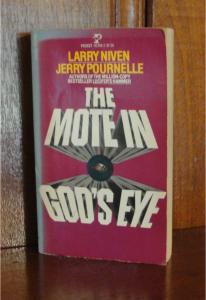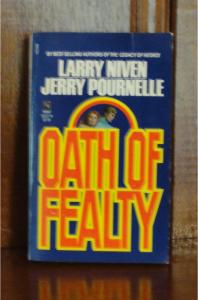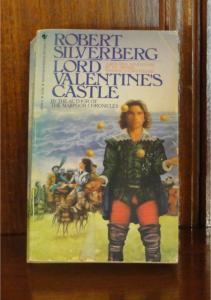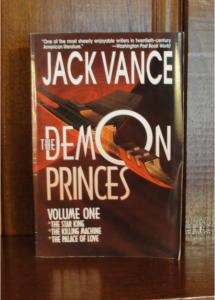
Conservatism connotes many different things: church, capitalism, limited government, nationalism, tradition, acceptance of inequality, rule of law, distain for unrestrained democracy, and even once included environmental conservation. So I have cast a rather large net to capture idealized conservative societies – and criticisms thereof.
Click the pictures for more info and/or to buy.

A good place to start would be Niven and
Pournelle’s
The Mote in God's Eye
On the
surface it is an alien first contact story with a twist: a far
flung human empire finds the aliens, yet the alien civilization is
older are more advanced. The story is well worth reading for having
one of the most well imagined alien races ever penned. But I
include it here for the very conservative human civilization which
mixes aspects of the British Empire and ancient Sparta. Jerry
Pournelle went on to backfill how this civilization arose from a
collapsing welfare state in books such as
High Justice
,
Exile and Glory
, and quite a few
others (some with collaborators).

Crime is out of control in the cities,
so the upper middle class is moving into giant managed
megabuildings to escape the chaos. Such is the backdrop of
Oath of Fealty
another Niven-Pournelle
collaboration. The work asks how much privacy would you be willing
to give up in order to have full security? And it suggests how a
new feudalism could arise from a dysfunctional democratic society
if we are not careful.

Much like Ronald Reagan, Robert Heinlein
went from ultra left-liberal to somewhere between conservative and
libertarian after seeing communism in action.
Starship Troopers
is Heinlein at his most conservative. Unlimited
democracy leads to corruption; the solution is having to
earn the right to vote. The Arachnids are out to get
humanity; the solution is a crack volunteer army with
brutally realistic training. (The book is largely a critique of how
we fought the Korean War.) I don’t agree with all of
Heinlein’s recommendations in this book, but it’s a
great read and quite thought-provoking. It’s also a good
antidote for the unrealistic isolationism favored by many
libertarians. (P.S. avoid the movie! Read the book.)
For those of a more religious conservative bent, be sure to read
C.S. Lewis’ Chronicles of Narnia books.
Yes, they are written for kids, but there are plenty of deep
insights and jabs at the progressives for adult readers. Read them
in the correct order. Some boxed sets put The Magician’s
Nephew as the first book, when it should be Book 6. Also: the
second book, Prince Caspian, is not as good as the rest. Do
read it for context, but realize that the books get much
better afterwards.
For a more adult take on C.S. Lewis utopian thinking, read
, the first in his
space trilogy
. The first portrays his utopia, a world where three
different intelligent species coexist. The second is a long
theological rumination. The third is pure attack on the
progressivism of his day – it is a Christian analog of
Atlas Shrugged, featuring many similar villains.

For a non-religious take on the theme of diversity
through non-democratic hierarchy, try Robert Silverberg’s
Lord Valentine's Castle
and its sequels.

For those who would still mix conservation and conservatism, a
great place to start would be with Jack Vance’s works. I
recommend his series,
The Demon Princes
, a
series I have reread multiple times for sheer enjoyment. On the
surface, these are not utopian novels; they are detective/revenge
stories against five extremely quirky master criminals who
destroyed the hero’s colony. But the backdrop of these
stories features a wild array of human civilizations scattered
across hundreds of worlds, civilizations that are truly
human, both for good and ill. There is no overarching empire,
and no Singularity. How this is achieved is truly
interesting…
For a more explicit mix of conservatism and conservation, see
Vance’s
Araminta Station
and its sequels.
For positive conservative portrayals on movies/television, you
generally need to go back to before 1970. Television portrayed an
America where private citizens casually owned weapons, fathers were
wise, free range children explored their neighborhoods
unsupervised, and children had respect for their elders. Even the
liberal shows of the day are conservative by today’s
standards. The original
Star Trek
defended
America’s Cold War, had two anti abortion episodes, and
endorsed Christianity. And, like The Demon Princes, Star
Trek rejected The Singularity as unsuitable for humans. The
only robots are alien, and cause mischief to humans. Attempts at
genetically improving humans proved disastrous in the 20th Century
and were since rejected. Note also the ineffectiveness of
Federation medicine and the limits on the ship’s computer
power. These were intentional plot features, as the crew
encountered post-Singularity civilizations, or the remains thereof,
frequently.
But for the most blatantly conservative utopia on television, break out
The Andy Griffith Show. Yes, it is a silly comedy,
but silly comedy is perhaps the best way to make a true utopia
entertaining. (It’s kind of hard to have true drama when
everything is working reasonably well.)
For the economic conservatives in the audience, check out the libertarian utopias for positive portrayals for extremely capitalistic societies.
Conservatives might also enjoy reading dystopian take-downs of non-conservative political positions, especially eeconomic leftist dystopias and social liberal dystopias. Some of the authoritarian and libertarian dystopias might also be entertaining to some of you.
But if you seek balance through criticism, try some of the conservative dystopias below.
Since Hollywood is full of liberals, my go-to source of conservative dystopias is movies over books. Some of these movies are good enough that you might enjoy them even if you are a conservative.
For a gentle warm-up, how about a conservative
dystopia starring conservative icon Charlton Heston: Soylent
Green. It’s a well-done wakeup call for those in denial
over global warming or the need for birth control. (Yes, global
warming is featured and the movie came out in 1973, well before Al
Gore took the national stage.)
Mix corporate domination with heavy-handed police and you get
movies like
Robocop,
The Running Man
,
and
Total Recall
. For a sustained hatefest of all things Republican, try
James Cameron’s
Dark Angel
series. The first season is
well done; the second gets kind of goofy.
For a few more examples dystopias of corporations run amok, see the libertarian dystopias
For written literature, try Fredrick Pohl’s
Gateway
[18+] for a well done dystopia inequality and environmental
destruction. John Brunner’s
The Shockwave Rider
[18+]
is perhaps the first cyberpunk novel – written well before
the term was coined – and features runaway corporatism and
intelligence agencies.

For a dystopia featuring an out of control religious
government, try If This Goes On, a novella in Robert
Heinlein’s
future history
.
(This book also features a
utopian short story, “Coventry” based on the City of
Refuge provision in the Bible. Heinlein had a love-hate
relationship with the Bible; Biblical references are scattered
throughout his works, both positive and critical.)
(The book and movie links are affiliate links. The reviews are genuine.)